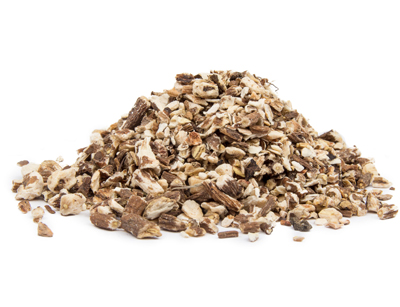No products
Dandelion root - 50g
Dandelion root (Radix Taraxaci) medical affects the liver, stomach, pancreas, intestines, kidneys and blood forming organs, used in the treatment of urolithiasis, helps in diabetes and chronic fatigue...
![]()
Content |   |
Binomial nameTaraxacum officinale Commonly called (often known as)Common dandelion StorageStore in a dry place at a temperature up to 25°C |
Description of herb
Dandelion - (Taraxacum offcinale) grows in meadows, borders, pastures and gardens as a difficult weed. According to the complex profile of the leaves, the English and French name of a dandelion (dandelion or dent de lion) literally means a lion's tooth.
For healing effects, the root (Radix taraxaci) is collected in the spring before flowering. After washing, the root is quickly dried in the shade or in the sun, or under artificial drying at temperatures up to 50°C. Insufficiently dried root is easily moldy, while very dry roots are often infested with worms.
Healing effects
The active substances contained in the root of the Dandelion stimulate the digestive organs, is a mild diuretic and cholagogue and generally are considered restorative agent with a favorable effect on the metabolism.
They have a positive effect on the function of the liver (excellent for cirrhosis), stomach, pancreas, intestines, kidneys and hematopoietic organs.
Dandelion root is used in the treatment of urinary and kidney stones, helps with diabetes (lowers blood sugar), chronic fatigue, enlargement of the spleen.
It works against degeneration of bones and cartilage, helps to induce menstruation.
It is also recommended for inflammation of the urinary tract, jaundice, febrile intestinal inflammation or inflammation of the gastric mucosa and constipation.
Active substances
Dandelion root is permeated with a milky sticky liquid - latex, whose main components are bitterness lactopicrin, taraxacin and taraxasterin, tannins, inulin, triterpenes taraxasterol and taraxerol, choline, inositol, sterols, amino acids, resins, essential oils, rubber (up to 25%) phyton and minerals especially calcium, potassium, magnesium, silicon and manganese. Vitamins A and C
The storage sugar is, instead of the usual starch plants, inulin, which is more suitable for diabetics.
Properties
Hepatoprotective, diuretic, tonic, mild laxative.
Recommended at
- anemia
- constipation
- kidney and urinary stones
- gallstones
- kidney, intestinal and liver diseases
- jaundice
- cirrhosis
- harmonization of metabolism
- chronic fatigue
Preparation and dosing
TEA 1
Preparation: One teaspoon of dried root per 100 ml of water and boiled for about 1 minute.
Dosing: Drink 2-4 times a day with 200 ml. Externally, it is sometimes used for hemorrhoids.
TEA 2
Preparation: 2 teaspoons of finely chopped dried root to 1/4 l of water, bring to a boil, infuse for 15 minutes and strain.
Dosing: Drink lukewarm, 2 cups a day at
- renal inflammation
- kidney stones
- liver disease
- spleen disease
- increased stomach acidity
- heartburn
- febrile intestinal catarrh
- constipation
- anorexia
Side effects
The active ingredients in the dandelion root are safe. Mild nausea can only occur in case of overdose. It can also be used during breastfeeding.
REMEMBER: Tell all your health care providers about any complementary health practices you use. Give them a full picture of what you do to manage your health. This will help ensure coordinated and safe care.

